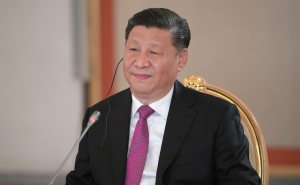Sara Hsu

As geopolitical conflict between the United States and China continues to grow, some China watchers have called into question the country’s economic direction. It could be said that China’s economic trajectory is the least clear it has been in decades, as China moves from a period of rapid growth and reform to what it deems “high-quality” growth and development. Due to the strong guidance of Xi Jinping, the best way to understand China’s long-term economic direction is through the words of its president.
So, what can we say about Xi? Xi Jinping is heavily guided by Marxist theory, particularly as viewed through a Chinese lens. While Marx called for capitalism to be entirely overturned, the first leader of economic reform in China, Deng Xiaoping, stated, “Both planning and the market are economic means. The essence of socialism is to liberate the productive forces, develop them, and eliminate them. Eliminate exploitation, polarization, and ultimately achieve common prosperity.” This diverged from the Marxist view that a market-based economy, viewed as unique to capitalism, was to be rejected. Deng believed that socialism would eventually lead to communism after economic development has been completed: “Socialism itself is the primary stage of communism, and China is in the primary stage of socialism, the stage of underdevelopment.”
Xi has clearly stated that China will move away from its previous economic trajectory beginning in 2021, and this is what has happened. “The ‘14th Five-Year Plan’ period is after my country has built a moderately prosperous society in an all-round way and achieved its first centenary goal,” Xi said. “In the first five years, our country will enter a new stage of development.” This stage of development involves moving toward common prosperity of the people and less emphasis on GDP growth rates. Xi has said that “we must strive to promote the common prosperity of all people and achieve more obvious substantive progress. … [We must] no longer simply talk about heroes based on the growth rate of GDP.”
Xi further says that development must be sustainable and healthy, in line with customer interests, and not in violation of the law. Xi has also noted that “practice tells us that development is a constantly changing process,” so that the development process will change over time.
Interestingly, Xi has also promoted market forces, stating that “market allocation of resources is the most efficient form….the market should play a decisive role in resource allocation.” The 14th Five-Year Plan has a section devoted to stimulating market vitality. In this section, it is written that “we will be unswerving in consolidating and developing the non-publicly owned sector and in encouraging, supporting, and leading the development of the non-publicly owned sector.” This section also commits to continued support for the state-owned sector.
Given the complexity of China’s ideological backdrop and the lack of precedents for a Chinese-type socialist market economy, it is challenging to interpret these statements. Perhaps the best way to understand them is to look at what China has been doing in 2021, when the country entered what its leaders called “a new stage of development.” Since that time, new regulations have been implemented, including a policy that lays out plans to further regulate the economy in the next five years. Regulations have sought to protect consumer data, curb excessive marketing practices, reduce gaming time, break up monopolies, and reduce tutoring profitability. Such regulations appear to constitute a weird hodge-podge of rules thrown out by an overzealous government. However, they are in line with what Xi Jinping has committed to do – protect the people, Communist style.
The new regulations, and the speeches made by Xi himself, do not attack the private sector in the wholesale way that some observers fear. While the rules have called out tech companies in particular for becoming too large or harming consumer interests, they have not sought to obliterate private firms, and according to statements by Xi and the 14th Five-Year Plan, noted above, this is not in the works. If this were the case, Xi’s economic trajectory would be clearer; what we are left with is an uncomfortable coexistence between a heavy-handed Communist government and a market economy. This domestic economic tension coincides with an increasingly hawkish view of China from the Western world, led by the United States, with international economic ramifications embodied in tariffs, blacklisting, and sanctions. This has created a substantial amount of economic fragility, which can be seen in China’s slowing growth numbers.
China’s long-term economic growth prospects are therefore far more muted than prospects in previous decades. Whether China can balance internal and external tensions is unclear, and gives rise to some questions, such as: will government economic intervention be successful in promoting common prosperity without stamping out market forces? Will the China-sanctioning international order force China to take a different path? What exactly will come to be included under the auspices of “common prosperity,” and will this become a euphemism for damaging practices? Finally, is China’s new stage of reform compatible with its anticipated role on the world stage?
While China’s intentions for long-term economic reform have been laid out in its speeches and doctrine, and embodied in recent reforms, this transition comes at a time of great uncertainty. China wants to usher in quality GDP growth; whether China will indeed be successful in implementing a phase of common prosperity is unknown.
No comments:
Post a Comment